Wilfrid Laurier University’s campuses are located on the Haldimand tract, the traditional territory of the Neutral, Anishnaabe and Haudenosaunee peoples, but we conduct research on the lands and territories of many First Nations, Inuit and Metis peoples from across Turtle Island. We recognize, honour and respect these Indigenous peoples as the traditional stewards of the lands and water on which we live, learn and conduct research.
Scholarship is critical to our advancement as a society and as human beings. So is reconciliation. We must move beyond “acknowledgement” to action. Scholarship can be a part of our reconciliation.
Whether that involves scholars partnering with an Indigenous community to address an issue of concern to them, braiding our knowledge systems and decolonizing knowledge, or helping the broader community to understand and better appreciate our collective responsibilities to create a just and peaceful society, all help enable us to live well together.
With gratitude,
Jonathan Newman
Vice-President: Research
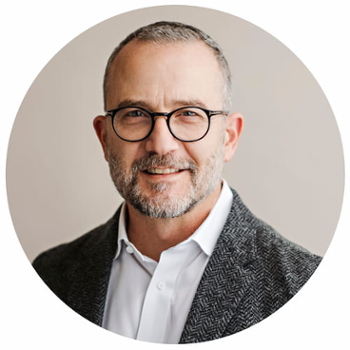

Homa Kheyrollah Pour (Geography and Environmental Studies), the Canada Research Chair in Remote Sensing of Environmental Change, was honoured with a Laurier Early Career Researcher Award. Her research integrates remote sensing observations, mathematical modeling and field data to understand the impacts of climate change on lakes and northern environments. Much of Kheyrollah Pour’s work takes place in the Northwest Territories, where she collaborates with communities to ensure safe winter travel.
When Alison Blay-Palmer (Geography and Environmental Studies) was appointed the United Nations Educational, Scientific and Cultural Organization (UNESCO) Chair on Food, Biodiversity and Sustainability Studies in 2019, she described herself as a “possible-ist.” With added resources, connections and support from one of the most important global institutions, she and her colleagues have been making change through their research. UNESCO recently renewed the chair until 2027, and Blay-Palmer’s focus will remain on promoting biodiversity conservation, addressing climate change and reducing food insecurity.
Laurier Early Career Researcher Award winner Christian Danve Castroverde (Biology) is examining how plant immunity and disease are affected by a changing environment.
“Our lab investigates at the molecular level what makes plants more susceptible to diseases when temperatures increase,” says Castroverde. “This will help us pinpoint what plant genes we can repair and engineer in order to enhance plant resilience to global climate change.”
Castroverde published a study in Nature, one of the world’s most prestigious life sciences journals, which identified a specific protein in plant cells that explains why immunity falters as temperatures rise. He and his co-authors figured out a way to reverse immunity loss and bolster plant defenses against the heat. They plan to test the same strategy on crops.
“Our grand vision is to ensure global food security for current and future generations,” says Castroverde. “I hope that our lab's contributions to fundamental, basic research will lead to translational roadmaps that we can use to safeguard plant immune systems and overall plant health in a changing world.”
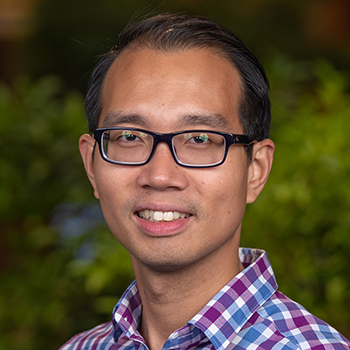
Though it is known that exposure to polluted air has a negative effect on mental function, Nikolai Cook (Economics) confirmed that air pollution specifically affects Canadian university student performance. He and his co-authors found that a minor decrease in air quality might be enough to move a student from an A- to a B.
Cook’s data was collected in Ottawa, and he was surprised to find an air pollution effect in a city where the air is relatively clean. Previous research found negative effects of air pollution on students in India, Brazil and Israel, where the level of air pollution is much higher. Cook also found the effects are most noticeable in STEM (science, technology, engineering, mathematics) courses.
To protect students from air pollution, Cook suggests writing exams in newer buildings that have better building materials and air quality systems. He also discovered that moving to an upper floor protects against half of the effect of air pollution since the major source of pollution – automobiles – is at street level. Simply moving further away from the source should lower exposure. Cook urges policymakers to prioritize efforts to improve air quality in urban environments.
Laurier PhD candidate Arash Rafat was awarded a Vanier Canada Graduate Scholarship, presented to graduate students who demonstrate leadership skills and a high standard of scholarly achievement. Rafat is studying how lake ice forms, grows and melts in a changing climate to determine if ice roads will remain a viable mode of transportation for remote communities in the Northwest Territories and what ice safety measures should be taken. His research is part of the Northwest Territories Cumulative Impact Monitoring Program.
Laurier was honoured for its sustainability and equity, diversity and inclusion (EDI) efforts at the 2023 Global Entrepreneurship and Engagement Excellence Awards in Higher Education. The Triple E Awards acknowledge the contributions of universities in their communities and are open to institutions around the world.
Laurier was a top-five finalist in two categories, including the EDI Community Engagement Initiative of the Year, for which it also won the People’s Choice Award. The award recognized the university’s community-based research partnership with the Government of the Northwest Territories. In response to urgent, complex challenges facing the NWT due to rapid climate change, Laurier has been working with northern partners to address priority needs.
Laurier also placed third in the Green University of the Year category, recognizing the university’s efforts to embed sustainable practices in its campus communities and beyond. Its recent sustainability successes include the installation of 11 electric vehicle charging stations; a $48-million capital retrofit project which will include solar thermal walls, 15,000 LED light replacements and a microgrid system; and a plan to achieve carbon neutrality by 2050.
Erin Dej (Criminology) won an Early Researcher Award from the Ontario Government for her project "Building Community Empathy for People Experiencing Homelessness.” As “not in my backyard” rhetoric grows in response to Canada’s housing crisis, Dej wants to foster respectful dialogue and correct misconceptions about homelessness in order to promote social inclusion. She presented her research at a recent Waterloo Region Community Town Hall called “No Fixed Address: A Talk about Homelessness and Encampments.”
Maurita Harris (User Experience Design) is the director of the Well-Tech Research and Design Laboratory at Laurier. Her research focuses on designing inclusive technology.
“I am exploring human behaviour and relationships with technologies, such as smartwatches, digital home assistants and virtual reality, to support older adults with and without impairments to live the lives they choose,” says Harris. “I also explore racial and health inequities to work toward a world where anyone can use these technologies.”
Harris’s work is inspired by her experiences growing up, seeing how technology did not support her family members as she had hoped. As a university student, she learned about human factors: the study of how people use technology.
“I realized I could work to create a better world for people like my loved ones who struggled to use technology,” says Harris. “Since then, I have worked to understand this friction to technology adoption to support older adults.”
The Well-Tech Research and Design Laboratory is tackling topics such as the potential correlation between extended smartphone usage and visual acuity in seniors; early onset dementia and mobile app use; and challenges for Black older adults.
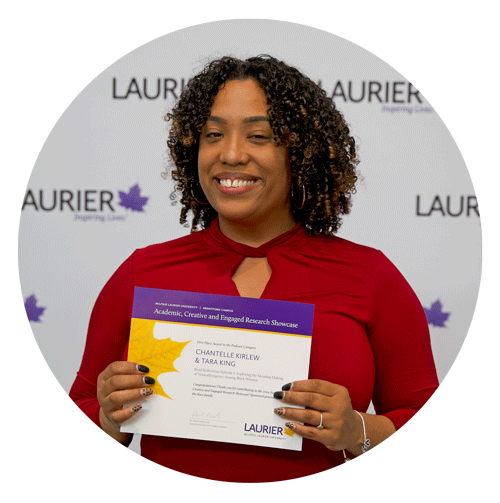
In 2024, Chantelle Kirlew and Tara King were awarded first place in the podcast category for “Exploring the Meaning Making of Neurodivergence Among Black Women.” Through lived experiences, they highlighted topics such as stigma, lack of support, masking and the treatment of Black women navigating the mental health care system.
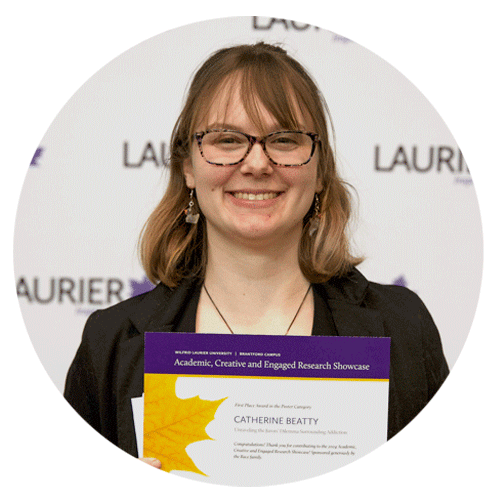
Catherine Beatty took the top spot in the posters category for “Unraveling the Jurors’ Dilemma Surrounding Addiction.” Beatty analyzed whether viewing addiction as a brain disease rather than a moral failing impacted jurors’ perceptions of a defendant’s accountability and expert witness credibility, or their sentencing recommendations.
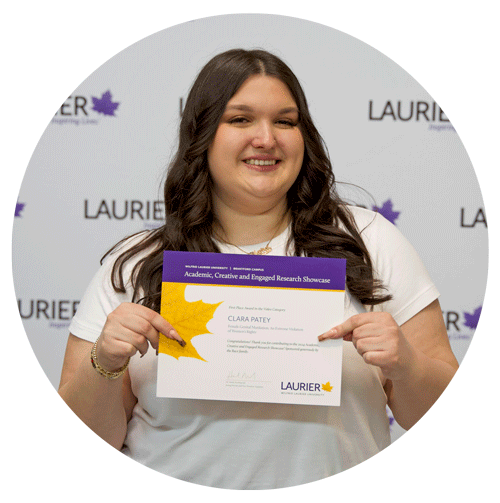
Clara Patey was awarded first place in the video category for her research on female genital mutilation. She explored traditions and ideologies, health consequences and addressed arguments concerning Western cultural imperialism.
Sediqa Akbari and Rohina Zaffari participated in Laurier’s Visiting Researcher – Scholars at Risk program at Laurier, which provides support to scholars who have been forced to leave their academic positions due to threats to their life and liberty. Both women fled Afghanistan and found safety in Canada. Through funding, access to library resources and faculty partnerships, the program enabled them to re-engage with their research goals.
Akbari and Zaffari collaborated with their SAR sponsor Bree Akesson (Social Work), an extension of a long-time research partnership that began in Afghanistan in 2016. They published an award-winning paper about psychosocial well-being, which inspired Kabul University to open its first counseling centre.
While at Laurier, Zaffari studied the well-being of Afghan refugees in Tajikistan and Akbari focused on improving the well-being of refugees during resettlement.
“It was a wonderful opportunity for me, connecting me with other academics and allowing me to work with Dr. Akesson on global adversity research,” says Akbari. “This is part of my pathway to find myself as a scholar, and even just as a person who wants to work and build a life in Canada.”
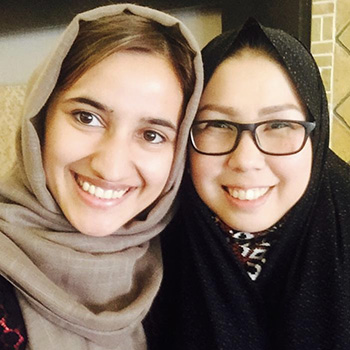
Sun Life has donated $750,000 over five years in support of Laurier’s Centre for Healthy Communities.
The Sun Life Centre for Healthy Communities is an initiative of the Laurier Department of Kinesiology and Physical Education, designed to connect undergraduate and graduate students to community organizations. It seeks to improve activity levels and the overall health of local young people, providing free or low-cost physical activity programming for high-priority youth to prevent chronic illnesses associated with sedentary lifestyles, including type-2 diabetes.
Sun Life’s funding will support exciting new developments, such as tailoring of programming and outreach to equity-deserving groups, expanding the geographic scope of programming with a specific aim to engage Indigenous youth in the region, broadening the scope of available health programming to include more mental health components, and increased investment in program measurement, evaluation and reporting, including hiring a dedicated research facilitator.
Founded in 2016, the centre conducts holistic and integrated research on physical activity and healthy living knowledge. The centre’s physical activity and educational programs have served thousands of at-risk youths in Waterloo Region.
Every two years, the United Nations’ International Organization for Migration brings together leading global experts to produce the World Migration Report, documenting the latest research and analysis on emerging mobility issues around the world. Three Laurier faculty members based at the Balsillie School of International Affairs contributed research to the latest edition: Jonathan Crush, Jenna Hennebry and Margaret Walton-Roberts. Crush and Hennebry served as academic reviewers, while Walton-Roberts co-authored chapter six, “Gender and migration: Trends, gaps and urgent action.”
The most pressing public policy issues, from climate change to trade agreements, tend to cut across jurisdictions, requiring cooperation and creativity from multiple levels of government. This delicate dynamic plays out differently across regions and time, and there are lessons to be learned from each approach.
Jörg Broschek (Political Science) spent 10 years studying those lessons as a Canada Research Chair (CRC). His CRC term ended in 2023 and Broschek was appointed the Laurier Research Chair in Multilevel Governance. He plans to build upon his achievements and continue exploring his core research questions.
“How do federal systems cope with major policy challenges?” asks Broschek. “How do they adapt? How do they initiate transformative policies? How resilient are they?”
During his tenure as CRC, Broschek developed a research agenda based on three basic pillars: institutions and processes and how they change over time; individual policy sectors, such as trade, energy and education; and theory and methodology, or the research tools themselves. These pillars will continue to shape new research questions, such as how leadership factors into multilevel governance. Do different leaders make a difference?
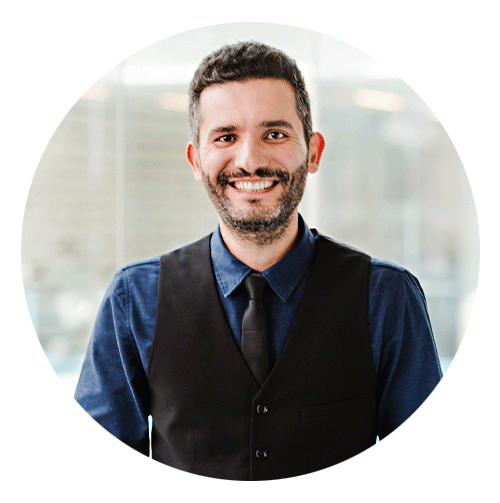
Ghamat (Operations and Decision Sciences) was awarded the Canada Research Chair in Business Analytics in Supply Chain. As chair, he will explore how data analytics can be used to address problems within supply chain and health-care operations.
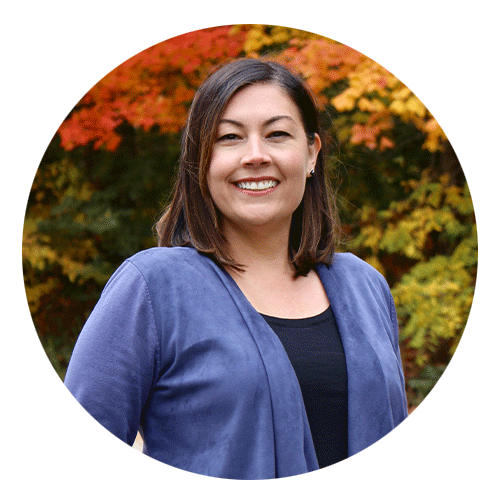
Leddy (History) was awarded the Canada Research Chair in Indigenous Histories and Historical Practice in Canada. As an Anishinaabekwe member of Serpent River First Nation, she has dedicated her career to the decolonization of Canadian history. Leddy received the 2023 Governor General’s History Award for Scholarly Research for her book Serpent River Resurgence: Confronting Uranium Mining at Elliot Lake.
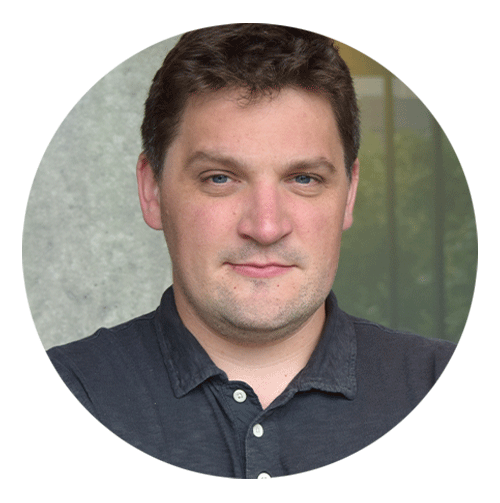
Spring (Geography and Environmental Studies) was awarded the Canada Research Chair in Northern Sustainable Food Systems. Alongside Indigenous communities in the Northwest Territories, Spring plans to build case studies of community-based programs supporting sustainable northern food systems.
Jenna Hennebry (Communication Studies) and Kim Roberts (Psychology) were named Laurier’s University Research Professors for 2023-24. The annual internal award recognizes excellence and leadership in research and provides time and funding for the winners to complete a major research project.
Hennebry is globally recognized for her expertise in international migration, migrant labour and gender equity. Her research facilitates productive exchanges between academics, policymakers and governments to advance the human rights of international migrants, especially women. As director of Laurier’s International Migration Research Centre, she disseminates the work of her colleagues internationally and engages in the UN Network on Migration, where she co-leads UN Women’s work stream on gender-responsive implementation of the global compact for migration.
As a developmental psychologist, much of Roberts’ research tackles sensitive issues concerning children in the legal system such as memories of sexual abuse and interviews of alleged child victims and witnesses. She has pioneered training techniques to improve child witness interviewing and is regularly consulted by judges, attorneys, police services and social work agencies. Roberts is currently studying how children use concepts of equity, diversity and inclusion in their choices about credible information.
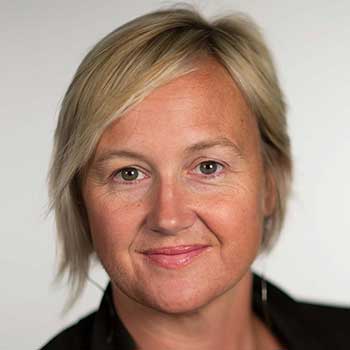
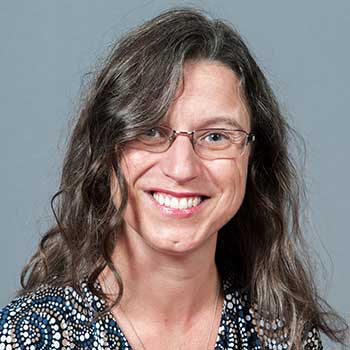
Early in his academic career, Ed Dandalt (Leadership) noticed that most leadership studies were focused on the private sector. Recognizing the wide-ranging impacts of public policy, he decided to focus his attention on public sector leadership.
Since joining Laurier in 2022, Dandalt has been prolific. Using a blend of policy analysis and cognitive research, he has published studies on how artificial intelligence affects physicians, the dynamics of public sector leadership, non-hierarchical leadership and leadership development in government institutions.
Dandalt recently completed two papers on the topic of climate leadership. In the studies, he addressed how political leadership relates to presidential sociopolitical activism. He also explored the dynamics of corporate sociopolitical activism among state-owned enterprises. Dandalt’s findings suggest that political leaders express views of climate actions that are associated with transnational, national and local governance systems, and that the agencies underscoring corporate sociopolitical activism are piecemeal rather than comprehensive.
Dandalt hopes his research will lead to the development of holistic policies that can more effectively address climate change.
In November 2023, Laurier’s Centre for Research on Security Practices hosted the Brantford Community Safety Search Conference. As opposed to a typical conference where people passively listen to experts, a search conference brings local experts together to create and implement action plans. All members of the Brantford community were invited to attend and decide how to address local safety concerns.
“It’s often assumed that decision-making has to happen through formal channels, but I find it’s most successful to just bring the right people to the table and help them make it happen,” says Tarah Hodgkinson (Criminology), a conference organizer and one of Laurier’s 2023 Early Career Researcher Award winners. She also recently won a Minister’s Award of Excellence from the Ontario Ministry of Colleges and Universities.
Affordable housing was one of four priorities identified by conference attendees. Hodgkinson’s research helped Dave Wiedrick, director of bylaw compliance and security at the City of Brantford, rethink the City’s approach to addressing homelessness. When police dispatchers receive a call about an unhoused person, they are now sending housing and bylaw officers who can connect the individual with social services.
This compassionate approach has improved the City of Brantford Encampment Network’s efforts, enabling it to quickly provide access to emergency shelters. Once sheltered, individuals are connected with staff to develop a personalized housing plan. Since July 2023, the team has helped more than 100 people find shelter.
Ryan Neepin (Education) is helping teachers and teacher candidates learn how to incorporate Indigenous knowledge and perspectives into the classroom. Because teachers are often fearful of saying the wrong thing, causing harm or being accused of cultural appropriation, Neepin’s research proposes a new approach: co-learning. Rather than having to be “experts” on Indigenous culture, teachers can use Indigenous-authored resources to learn alongside their students. Together with his colleagues in the Faculty of Education, Neepin is also working to increase Indigenous representation in the teaching profession.
While completing her master’s degree, Abbi Longmire’s (MSW ’24) research focused on Queer Liberation Theory, the idea that queer movements must move beyond acceptance toward liberation. While there has been societal progress in securing individual rights, such as same-sex marriage, many members of the 2SLGBTQQIA+ community remain marginalized.
Longmire and Cameron McKenzie (Social Work) hosted a Queer Activist Symposium at Laurier where 69 participants, presenters and organizers met over the course of two days. It included presentations by Canadian historians and activists across intersectional movements such as Black Lives Matter Toronto and O:se Kenhionhata:tie Land Back Camp. The event concluded with a presentation on Queer Liberation Theory.
After sharing the three core values of Queer Liberation Theory – anti-assimilationism, political economy and solidarity across movements – group discussions revealed four additional priority areas including access and diversity considerations; decolonizing community and activism; crediting and centring marginalized voices, concepts and history; and creating a platform for future generations. Longmire and her team produced a comprehensive community report to present at conferences in the coming years.
Social Work PhD student Laura Thibeault, a member of the Dokis First Nation, was awarded the Pierre Elliott Trudeau Foundation Scholarship, the first time a Laurier student has won the award. It is regarded as the most prestigious doctoral award for social sciences and humanities in Canada. Thibeault was also awarded a 2024 Vanier Canada Graduate Scholarship.
Thibeault’s research is grounded in her ongoing personal journey through infertility as an Anishinaabe woman. Within her research, she wants to honour and gather stories from First Nations women who have also experienced infertility and learn from the ancestral and personal stories of First Nations Elders, Knowledge Keepers and Healers.
“I was taught exclusively by Indigenous women, grandmothers and allies,” says Thibeault. “From this experience, I knew that the circle at Laurier was filled with rich matriarchal love and wisdom that I trusted to support me.”
Thibeault’s goal after her doctoral studies is to enhance the knowledge and skills for health-care providers, helping them recognize the unique social and cultural context of trauma, grief and loss associated with infertility for Indigenous women.
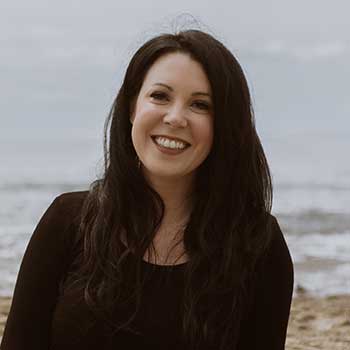
Together with a group of Indigenous and non-Indigenous scholars, Heidi Swanson (Biology) translated recommendations from Canada’s Truth and Reconciliation Commission into concrete actions and approaches scientists can take to meet the needs of Indigenous peoples. These 10 calls to action for natural scientists formed the basis of a companion documentary, Signal Fire, which features stories from the authors and their colleagues across Canada. It is available for viewing online.
Keri Cheechoo (Indigenous Studies) is Laurier’s first Grundy Indigenous Scholar, a position that aims to further Indigeneity at the university, attract and retain top Indigenous scholars, share knowledge and foster relationships with the wider Indigenous community.
“I am a published poet,” says Cheechoo. “I use poetic inquiry to connect my spiritual aptitude for writing with educational research. And I use my poetry to make space for Indigenous voices by interrupting and subverting western constructs of academic writing.”
Cheechoo’s research is focused on incorporating Indigenous knowledge and experiences into school curricula and developing new forms of teaching and learning.
“There is no singular Indigenous education theory and practice discourse,” she says. “There is a large collective of Indigenous scholars collaborating through their own epistemological spaces that include worldviews, ways of knowing and ways of being. Knowing this, I share from my own positionality as a Cree scholar-educator who specializes in Indigenous education but also incorporates teachings from those whose scholarship resonates with my own pedagogy.”
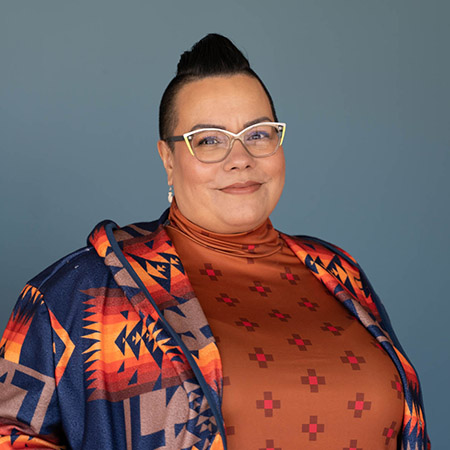
Laurier’s Enactus team claimed a top-four finish at the 2023 Enactus World Cup after winning the Enactus national championship. Enactus Laurier’s winning projects, Kuponya Innovations and Safi, exemplified the group’s dedication to transforming lives through entrepreneurial action. Kuponya Innovations is building affordable, sustainable and climate-resilient tiny homes in remote northern Indigenous communities. Safi has created a simple, cost-effective pasteurization device to ensure the production of safe and nutritious milk by small-scale dairy farmers in East Africa.
It has been widely suggested that generative AI has the potential to enhance human creativity. If that proves to be true, will human creators accept the assistance or be threatened by it?
Tripat Gill (Marketing), the Laurier Research Chair in Consumer Insights and Innovation, explored that question in two experimental studies. In the first study, he evaluated new advertising slogans for a business school that were generated by either ChatGPT-4 or MBA students who attended the university. Gill’s team found that generative AI slogans were rated more persuasive and meaningful, but not more novel than the human-generated ones.
In the second study, Gill assessed whether human creators would be willing to accept the assistance of generative AI in an incentivized task that rewarded the most persuasive advertising slogans. Researchers found that even though generative AI could enhance the quality of the ideas, using it as a tool was an ego threat for participants. Those who were least receptive to AI assistance perceived themselves as highly creative, yet scored low on an established test of creativity.
Gill’s findings suggest that while generative AI can be an effective tool for creative marketing tasks, its potential may be hindered by human psychological barriers.
Sarah Poynter (Health Sciences) was awarded infrastructure funding from the Canada Foundation for Innovation’s John R. Evans Leaders Fund to support her study of cancer immunotherapeutics.
Poynter’s research uses nanoparticles – tiny particles of matter undetectable by the human eye – to deliver nucleic acid to healthy and cancerous cells. Nucleic acid stores genetic information and is found in some viruses, and it induces an immune response in healthy and cancerous cells.
Poynter received $80,000 to further her research and buy a dynamic light scattering instrument, which can measure and characterize nanoparticles, and a specialized microscope to monitor cells in real time.
“In healthy cells, observing immune responses helps us to learn more about the innate immune pathways that sense and respond to these nucleic acids,” says Poynter. “In cancer cells, we have the potential to develop better cancer immunotherapeutics using these nanoparticles as a base. These fundamental pathways form the foundation of our immune system. We hope to gain insight into our general health and wellness and our understanding of many diseases.”
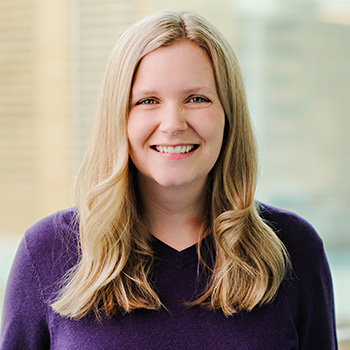
Laurier’s Centre for Supply Chain Management will be renamed the Einwechter Centre for Supply Chain Management in honour of a generous $1 million donation from Laurier alumnus Dan Einwechter (BBA ’77). Housed within the Lazaridis School of Business and Economics, the primary mission of the centre is facilitating and coordinating research in supply chain management. Named one of Laurier’s 100 Alumni of Achievement, Einwechter is the chairman and founder of Challenger Motor Freight Inc.
The Mathematical Association of America honoured Angèle Foley (Physics and Computer Science) with its 2023 David P. Robbins Prize for novel research. She and her collaborators Stephanie van Willigenburg, from the University of British Columbia, and Samantha Dahlberg, from the Illinois Institute of Technology, were recognized for disproving a 1995 conjecture in graph theory.
In its simplest form, graph theory involves studying varying structures of connected nodes in which some nodes can be related. A typical example might represent individuals in a social network. A graph could also use nodes of different colours to represent times and connecting lines to represent individuals, helping to visualize schedules and conflicts.
In a 1995 paper on the chromatic symmetric function, mathematician Richard P. Stanley stated that there was no known graph that was not contractible into a claw pattern and whose chromatic symmetric function was not e-positive. That is, not a positive linear combination of elementary symmetric functions.
Foley and her partners disproved the theory by uncovering infinite families of graphs that are not contractible to the claw and whose chromatic symmetric functions are not e-positive, opening up new avenues in graph theory.
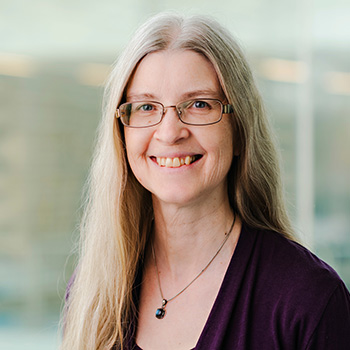
The Department of Economics at Laurier’s Lazaridis School of Business and Economics awarded deserving students with 2023-24 Undergraduate Research Prizes.
Stephanie Caleca and Lauren Dillon won Peter Sinclair Awards for their research papers. Caleca was honoured for “Drunk Driving - Progressive Transportation Makes for a Regressive Habit Amongst Today's Young Adults,” while Dillon studied the effects of environmental crises on local economies in her hometown of Walkerton, Ont.
“Through this experience, I’ve come to appreciate that economics is present in every aspect of our lives, extending far beyond policy and fiscal measures,” says Dillon. “Despite Walkerton’s tragic water crisis, it is important to recognize the resilience of the town and its community. The lessons learned from the crisis have catalyzed positive changes in policy, prompting the government to enact crucial legislation such as the Clean Water Act and the Ontario Safe Drinking Water Act.”
Bryan Jones won the Undergraduate Short Paper Prize for “Coins, Coffers, and Currencies: An Economic Analysis of Daniel Abraham’s The Dagger and the Coin."
Kevin Day (Composition) was awarded a MacDowell Fellowship for Music Composition. He spent six weeks at MacDowell’s artist residency in Peterborough, New Hampshire where he completed his first commissioned opera project. Lalovavi, which means “love” in the Tut language created by enslaved Black Americans, is an Afrofuturist-themed production set in the year 2119. It will have its world premiere at the Cincinnati Opera in 2025.
Barbara Assiginaak (Music) was appointed a member of the Order of Canada, one of Canada’s highest civilian honours. She was recognized for her diverse contributions to contemporary music.
Assiginaak teaches music composition at Laurier. Rooted in the Anishinaabe aural/oral traditions of singing, drumming and the pipigwan/bbigon (cedar flute), she is also classically trained in piano and other European instruments, Western music theory and composition technique. Assiginaak studied music composition at the Royal Conservatory of Music’s Glenn Gould School at the University of Toronto, the University of Music and Performing Arts in Germany and Centre Acanthes in France.
Assiginaak’s teaching at Laurier draws on decades of work as a composer and performer alongside orchestras, choreographers, visual artists, and opera, theatre and film directors. She primarily collaborates with fellow Indigenous artists, educators, scholars, community leaders and Elders.
In September 2023, the Laurier Hub for Community Solutions (LHCS) celebrated its first anniversary. Conceived as a matchmaker between the university and groups looking to address community-based challenges and opportunities, LHCS contributed to more than 50 projects in its first year.
The City of Brantford was a productive partner for Laurier researchers. James Popham (Criminology) worked with the City’s Director of Communications, Community Engagement and Customer Service on a City Budget Priorities community engagement campaign. The Sun Life Financial Centre for Physically Active Communities assisted the Community Service and Social Development Department with a citywide questionnaire about recreation use, while Laurier’s Centre for Research on Security Practices and the City’s Department of Community Services and Social Development are collaborating on community programs to proactively divert youth from gang involvement and the criminal justice system.
LHCS fostered many experiential learning opportunities for Laurier students, including teaching young people how to play musical instruments, documenting local history with the Waterford Heritage and Agricultural Museum and designing storage solutions for individuals experiencing homelessness. Fusion Beats, a multicultural music and dance event, was also a great success.
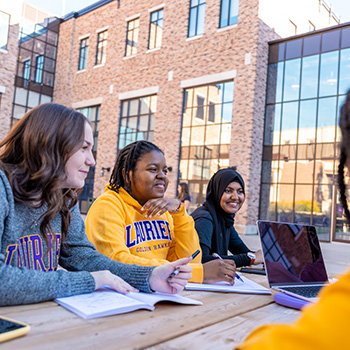
Emily Chau, an undergraduate student majoring in User Experience Design, was honoured with the Early Year Researcher Award at the 2024 ACERS competition in Brantford. Chau’s work centered around forensic DNA phenotyping (FDP), a technique that generates a predictive facial sketch based on the DNA of a person of interest. In her award-winning video, Chau explores the application of FDP for victim identification and the development of regulatory frameworks.
Recognizing the absence of diverse female voices in the wind band conducting sphere, LaToya A. Webb (Music) decided to spotlight the triumphs, struggles and wisdom of women in band directing. She and her co-curator Julia L. Baumanis published an anthology called GO ON, Tell Your Story! It’s a collection of narratives from women band directors, including Cynthia Johnston Turner, dean of Laurier’s Faculty of Music. Webb, director of the Laurier Wind Orchestra, hopes these stories connect readers to shared experiences.
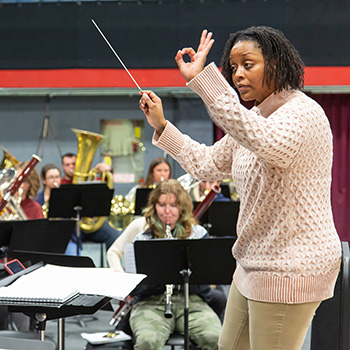
In his co-edited book Feminist Posthumanism in Contemporary Science Fiction Film and Media: From Annihilation to High Life and Beyond, Russell Kilbourn (English and Film Studies) and his co-authors explore how science fiction films and video games disrupt and transform traditional ways of thinking about women through a re-envisioning of how they are represented onscreen.
“There are posthumanist perspectives within science fiction’s utopian and dystopian stories of transcending the human, which also push beyond the universal model of the self posited by 18th-century humanism: white, masculine, heterosexual and relatively affluent,” says Kilbourn. “Feminism and posthumanism share the common ground of deconstructing this humanist subject in order to clear the way for new kinds of subjects, human or otherwise.”
Kilbourn co-edited the essay collection with Julia Empey (PhD ’22), a graduate of Laurier’s PhD in English and Film Studies program who is currently a postdoctoral fellow at the University of Cambridge. They contend that films as diverse as Blade Runner 2049 and Her, or computer games like Mass Effect and Horizon: Zero Dawn, are effective vehicles for discussions of critical feminism.
“Science fiction is very popular with a wide range of spectators, especially younger men, and so for stories to ‘smuggle in’ this kind of material is very significant,” says Kilbourn. “Popular culture can be a ‘machine for learning’ while enjoying oneself.”